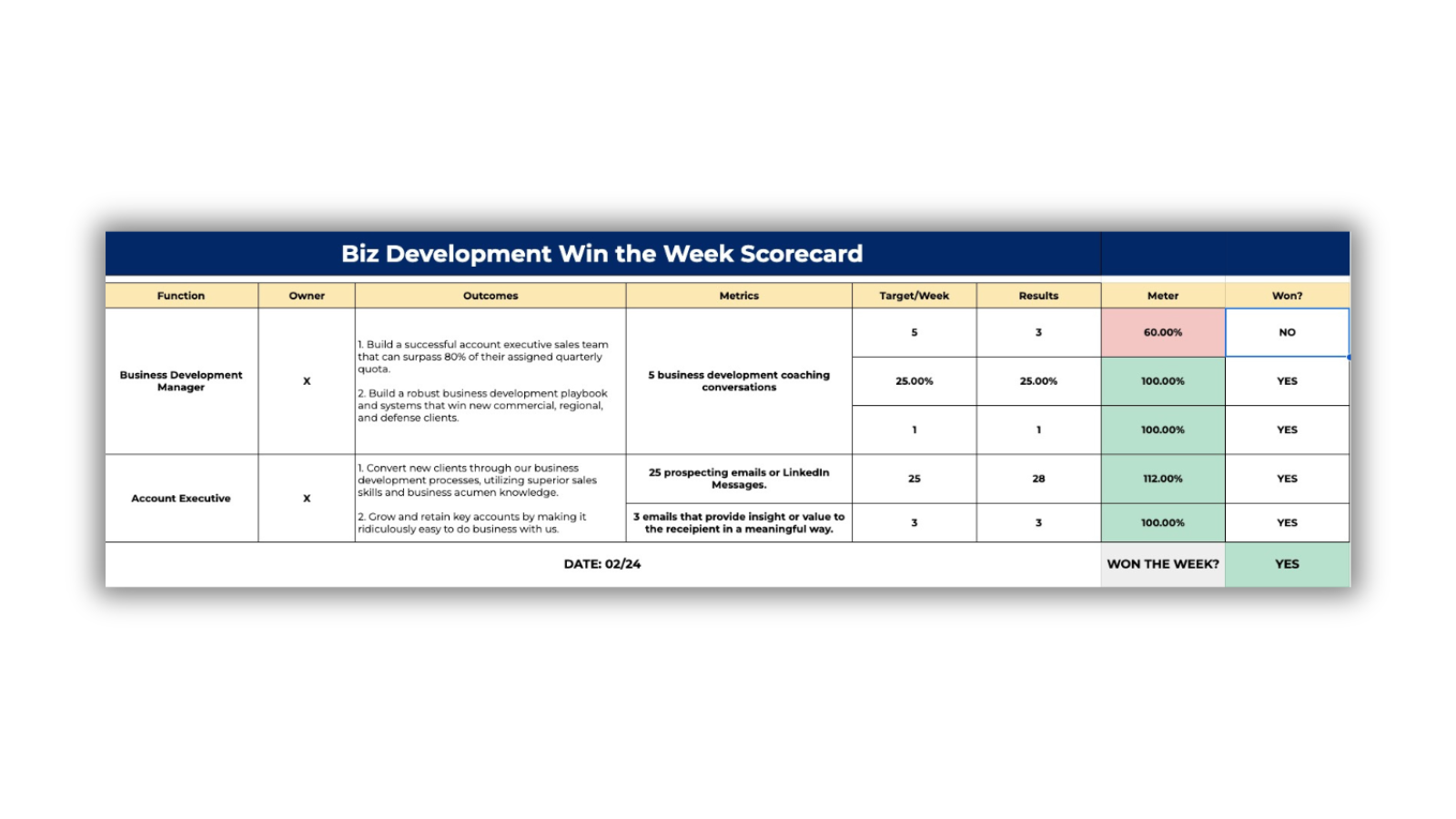Mastering Sales Productivity: The 1 Powerful Habit That Unleashes Elite Salespeople from the Rest
They don't focus relentlessly on the year. Or the quarter.
And it’s not that they’re incredible communicators or that they’ve assembled an incredible tool chest of hard and soft skills. Nor is it that they have deep business acumen and can speak to any stakeholder in a company. They all share the common trait of having a relentless focus on the few things that matter the most, which maximizes their sales productivity.
But here's the rub:
Many get this all tangled up. They zero in on quarterly or annual benchmarks, ensnared in a relentless chase to "hit numbers." Yet, the real magic happens weekly, where small triumphs start a domino effect of success.
I used to hate going to city malls.
With the concoction of shitty food, over-scented candle stores, and perfumes that only belong in a visitor-less brothel, it was too much. But that wasn’t the worst of it.
One evening, as I buried a finger in each nostril to mask the smell, my wife and I journeyed through a mall. Some vendors sell goods in the middle of the aisle, and they salivate when anyone with a pulse passes them. We passed by a woman’s perfume vendor, and the skinny, overzealous gentlemen asked me if I wanted a spray. I'm not sure why he asked me, but I replied, “No, thank you,” and he proceeded to argue with me. I might have indulged in a gentle headbutt if I weren't with my wife, but I ignored him.
And that’s the problem with most salespeople.
They’re not focused on the few things that matter the most. They try to close whatever lead that teases interest. They focus primarily on the end result of hitting their numbers and forget sales is first about creating value for the customer.
Great salespeople know the drill.
They channel their energies into delivering unmatched value to their ideal clients, steering clear of the quagmire of non-essential tasks and vague KPIs.
They master the art of winning daily and weekly.
Why do superior salespeople focus on more than just numbers to maximize their sales productivity?
Not all sales roles are created equal.
Some require people to be on the “road” 24/7 to make a living. Others claim you'll need to work 12 hours daily to meet your "numbers" or make thousands of cold calls per week.
And that's fine for some periods of time, but it's not conducive to a life well lived.
Great salespeople focus relentlessly on providing value for clients while also investing in different domains of their life. They develop their physical body to look and feel good. They are ferocious learners, always seeking ways to improve their hard and soft skills. They invest deeply in relationships. They understand that great sleep is paramount to managing emotions, increasing energy levels, and maximizing mental capabilities.
They don't spend all day directly selling, but everything they do in their day improves them.
They maximize their daily Return on Time.
They invest their time in winning the week.
So, we've established what sets great sales professionals apart from the mediocre 99%—they win each and every week.
But how?
The Weekly Win Metrics
The best way to do this is by adopting a "Win-the-Week Scoreboard," inspired by insights from the book Pinnacle; they keep their eyes on the prize with a clear set of metrics and weekly goals. Whether you're steering the sales ship or rowing the boat, crafting this scoreboard is your ticket to visualizing performance and setting attainable milestones. If you're a sales leader, you create this scorecard for your team. If you're a sales rep, you can request your manager create this or create one yourself.
This structured approach helps visualize performance and set realistic goals while maximizing weekly sales productivity.
Here's how it works:
Step 1:
Kick things off by selecting metrics that truly reflect sales performance. Opt for a spreadsheet to lay out the landscape, categorizing by Function, Owner, Outcomes, and so forth. Here's a peek at what it might look like:
Step 2:
The metrics for sales teams, starting with the Sales Manager, should be listed, allowing for a clear overview of responsibilities and targets.
Setting weekly targets involves dividing annual goals by 52 to create manageable, week-by-week objectives.
According to the authors of Pinnacle, they recommend:
"Focus on input metrics that its owner can action. 'Number of conversations had, and value of proposals issued' is better than 'number of contracts signed' even though the latter is the desired outcome of the former. We don’t want pushiness to backfire nor to compromise contract terms just to make the weekly numbers."
Step 3:
Finally, determining what constitutes a successful week is crucial, with an initial recommendation to aim for hitting over 50% of the targets. This threshold can be adjusted upwards as the team refines its metrics and targets, moving towards a more effective and challenging set of goals.
The Weekly Priorities
Next, successful salespeople review their week and plan the five to seven key priorities for the coming week—every week.
Some of these priorities will be key tasks or projects that help them hit their weekly scorecards or quarterly goals. If you're aiming for a ten-million-dollar annual revenue target, what does that mean for this week? Calculate it. Own it. Break it down into quarterly, monthly, and weekly milestones. Prioritize your weekly purposeful priorities based on their importance.
If everything is a priority and urgent, nothing is.
Get brutal about your weekly prioritization. Ask yourself, "Will this help me make meaningful progress on X?"
No?
Delete, defer, or delegate it.
You'll then use a simple notecard to execute your sales day.
They use the Return on Time (ROT) notecard system.
Your Return On Time is the daily positive investment of time and energy that translates into a life full and a career of purpose and meaning. Or, with the wrong investments, it'll create a rotten existence.
Before you do anything else, you have to decide what's most important to you, right now.
Once you've done that exercise, you create a simple yet powerful notecard that guides your daily decisions and priorities.
Here's how it works:
Step 1: Detail The Daily ROT on the front of an index card, then laminate it.
The front of your card is your Daily ROT.
It's the ten things you must do daily to maximize your Return On Time.
Because we're talking specifically about developing your sales career, here's what it could include:
Get 8 hours of high-quality sleep.
Exercise for 45 minutes and/or walk 15,000 steps.
Spend at least 30 minutes outdoors.
Play with kids.
Show [spouse's name] I love her/him.
Meditate for 30 minutes.
Improve business acumen in a meaningful way
Make 20 high-impact sales calls.
Provide value/insights to 5 accounts/opportunities.
30 minutes of training/learning sales techniques, improving business acumen, and/or researching industry news.
Step 2: Write your 3 Purposeful Priorities on the back of the card.
On the other side of the card, jot down three Purposeful Priorities daily.
These lighthouses guide you towards meaningful progress on your most crucial projects and goals. They're not random, low-value tasks that add no value to your time investments. They help you make progress on the few things that matter the most.
So, if you're focused on converting five new clients this quarter, your three purposeful priorities for a specific day could be:
Add 5 contacts to the X target account and make the initial prospecting calls to each.
Send the proposal to X and call them 20 minutes after it's sent.
Call finance to get the status of the credit application for Y.
By honing in on what truly matters and mastering your weeks, you'll elevate your sales game and reshape your life. Dive in, focus on the critical few, and watch your sales—and your world—transform.
Start your Daily Return On Time Notecard today.









